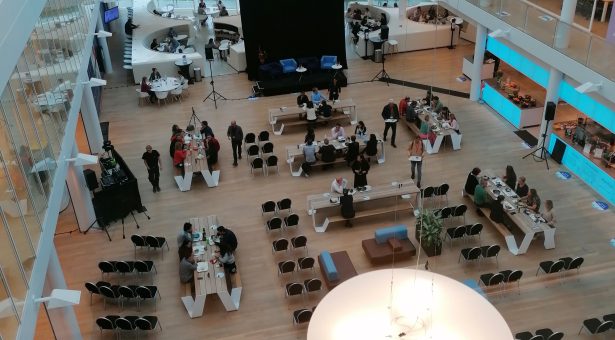Martina gets a taste of a career with a multinational company from her PIPS

Martina Poletti, a student based at the Earlham Institute, wanted to see how academic research in microbiology is applied in an industrial setting, and become familiar with the job of Scientist/Bioinformatician within a multinational company. She undertook her internship at Danone Nutricia Research, in The Netherlands, using her contact network to identify names of scientists in the company to approach to arrange her PIPS.
Martina worked across two core projects (one internal and one external with a collaborator at the University of Cork) related to analysing microbiome data from human and mice studies. Within each project Martina had the freedom to execute her own process towards the general goals. In addition to the analysis of the data, Martina was in contact with the other departments of Danone (Data Science, Nutrition & Metabolism, Product Development, Immunology) as well as the external university partner to discuss the results of the analysis and see how it could be translated into a Patent filing strategy or for product development reasons. She completed the two projects within 6-8 weeks so asked to work on a third project. The work was very interdisciplinary, so she had to learn different areas of knowledge fast and needed to interact with the different departments. Martina’s supervisor at Danone reflected that it was “very impressive on how fast Martina picked up the ecological side of microbiology in which she had no experience prior the internship”.
Martina developed many transferable skills during the placement. “I believe I became more self-confident when approaching people from different backgrounds and different roles at the company. … week by week, I was more confident in asking questions and introducing” reflects Martina. She increased her knowledge, especially on food products and specialized medical nutrition, and also on how to apply scientific research to product development and patenting purposes. “I definitely improved my communication skills, in particular I learned how to better communicate complex scientific ideas to other people which are not working in the same area and sometimes not in research (e.g. regulatory, marketing, etc)” adds Martina.
Martina learnt a lot about the culture of working in a large commercial company as well as learning how to communicate her scientific findings in different ways to different departments that have different levels of understanding the science and data she was presenting. There was a lot of interest in the application of findings for patenting and the importance of the results for the customer, so Martina needed to convert her findings to ‘impact sentences’, which allowed her to see science from a different, more practical angle.
Martina proactively organised one to one meetings with several wider members of the company, senior scientists and team-leaders in areas related to her research interests, to help her understand opportunities for future work, including different types of role such as research scientist, bioinformatician, project manager, and medical affairs. Martina found the placement helpful as it made her realise the value of a PhD when looking for positions in research in a company, and also clarified which type of positions she could apply for after finishing her PhD. The Director of the Department at Danone said “Great skillset, good mindset, pleasant to interact with. We could really use someone like Martina in the future”.
She advises future PIPS students to be proactive when it comes to talking to as many people as possible during your internship and not to be afraid to ask for more, if you feel that the allocated tasks are not enough for you in order to make the best your of your time at the company/organization.
